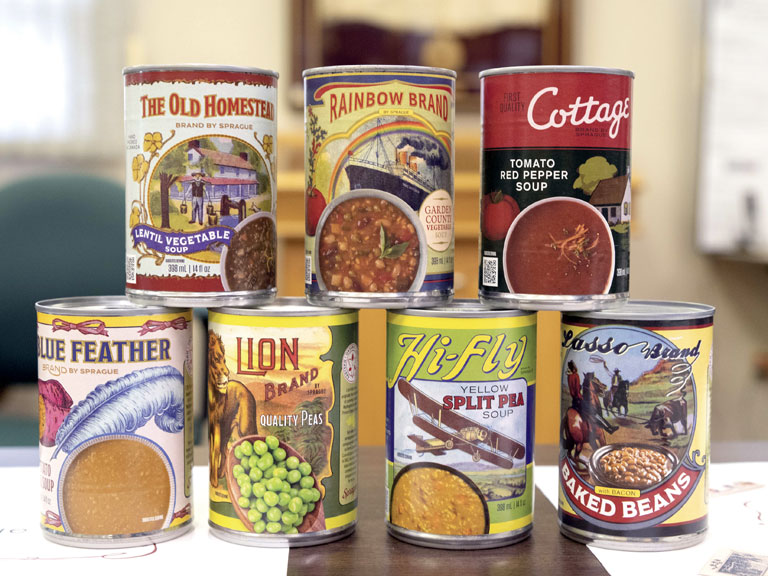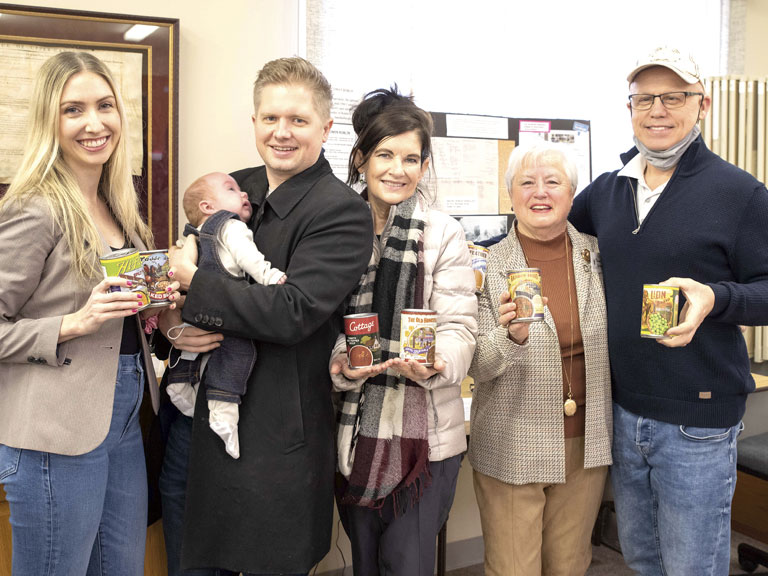County News
Heritage Hub

Flashback February fundraising initiative launched
The village of Ameliasburgh is a treasure trove of heritage and historical resources, and the recently formed Ameliasburgh Heritage Hub is intended to combine all of these under a single umbrella to provide an enhanced experience for visitors. “Ameliasburgh village is home to several historical and interest groups. We were all working in isolation, facing many of the same dilemmas and challenges—a lack of promotion, a lack of funding and a lack of volunteers,” says Beverly Sprague, president of the Marilyn Adams Genealogical Society. She says the heart of the village is the Al Purdy Library, a converted one-room schoolhouse, meeting place and early home of the 7th Town Historical Society. Within an easy walking distance is the Al Purdy A-frame, which was the home of Al and Eurithe Purdy, and which is now used for an artist in residence program that attracts writers and poets from across Canada. There are eight or nine residencies expected this year, and part of the mandate for the artists is to go out into the community and promote their art. The Ameliasburgh Heritage Museum is a collection of buildings and artifacts that highlight the area’s cultural history. There is a working blacksmith’s shop, a steam-driven flywheel and a number of educational displays. It is also home to the De Vries natural heritage collection, comprising over 500 taxidermy pieces. Over the winter, the County canning industry display was moved from the Wellington Museum to this location. The village is also home to the Quinte Educational Museum and Archives, which boasts a collection of rare textbooks and houses a comprehensive history of the one-room schoolhouse in Prince Edward County. The century-old Victoria Schoolhouse is on the grounds of the Ameliasburgh Heritage Museum. Rounding out the table of historical sites is the Marilyn Adams Genealogical Society, which is an accredited research library. There are over 8,000 titles in its collection, including family histories and the only hardcopy of the Victoria Cross records in North America.
These different organizations, and several community groups, make up the Ameliasburgh Heritage Hub. “It’s a combination of these groups working together to promote and market the rich historical heritage that exists within the village, to provide a more enriching experience for the public that come to visit us,” says Sprague, whose family in the County now spans 10 generations. “The County is more than sand and grapes. We have deep roots here. We need to market those roots like we do our beaches and wine. We have incredible history here. It’s down every road and around every corner, and we need to embrace our history; we need to show it off.”
Showing off that history does require some funding, and to that end the Ameliasburgh Heritage Hub partnered with Sprague Foods to offer a selection of canned vegetables with labels that celebrate the County’s canning industry past. On February 22, Keenan Sprague of Sprague Foods unveiled a series of commemorative cans at the Marilyn Adams Genealogical Society. Keenan and Beverly are third-cousins, and back in the heyday of the canning industry Beverly’s side of the family provided County tomatoes to Keenan’s side of the family for canning. Sprague Foods, which started in Mountainview in 1925, became involved in the project after historian Peter Lockyer reached out to them to spearhead a fundraising initiative that celebrated the County’s canning industry. “Because of the County’s history of canning, it seemed like the perfect initiative for us,” says Keenan Sprague. “When canning came here in the 1880s, it solved the problem of food security for people throughout the year, not just having food during the growing season. There were dozens of canning factories, representing many families, and they were social hubs as much as they were places of work.” The County’s canning industry declined precipitously in the mid-twentieth century, but Keenan says the ethos of those early days is still part of Sprague Foods’ operation. “The entire business model was centred around using locally grown crops. Now we sell certified organic foods, but at that time everything was organic because there was no widespread adoption of pesticides or herbicides. So everything was local and organic, and now that’s where we are focusing our energy today. The County has a special place in our hearts because that’s where we started and that’s where the Spragues live, and it’s an honour for the Sprague Canning Corporation to carry the torch of all those families that participated in this industry for many years. It’s important to remember how widespread the industry was. It really dominated the local economy for decades.”
The commemorative cans are available at the Wellington and Ameliasburgh libraries, at Macaulay Heritage Park, and the Marilyn Adams Genealogical Society and at Ameliasburgh Heritage Village

James Grant Sprague is the youngest member of the Sprague Foods family, and is named after the founder. He is seen here with his parents, Catherine and Keenan, and grandparents Jane and Rick, with distant cousin Beverly Sprague (second from right), president of the Marilyn Adams Genealogical Society at the launch of a line of products featuring heritage labels

Beautiful works or art on those soup cans and a wonderful reminder of the importance of sustainable, local economies across our land.
Heritage Rocks!!! Keep up the great work for the community !